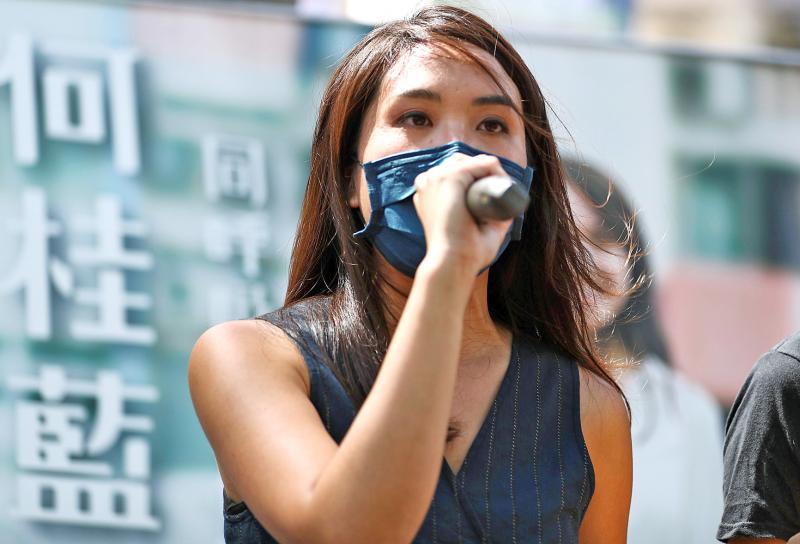Hong Kong’s largest national security case was yesterday sent to trial, after lingering 15 months in pretrial procedures during which most of the 47 defendants were denied bail.
Under the National Security Law, which Beijing imposed in 2020 following huge, sometimes violent democracy protests, the pro-democracy figures are charged with “conspiracy to subversion” for organizing an unofficial primary election.
Subversion is one of the four major crimes under the security law and can carry a punishment of up to life in prison.

Photo: AFP
The defendants, aged between 24 and 66, include democratically elected lawmakers and district councilors, as well as unionists, academics and others, whose political stances range from modest reformists to radical localists.
The case was first brought to court in March last year, when most of the 47 were denied bail after a four-day marathon hearing before a judge handpicked by the government to try national security cases.
Most of the pretrial hearings over the past 15 months, though held in an open court, have been subject to reporting restrictions — with the court repeatedly refusing applications from defendants and journalists for them to be lifted.
Family members and legal representatives have told reporters that the opaqueness has made the defendants “frustrated and depleted,” and allowed the prosecution to “move the goalposts.”
After a three-and-half-day hearing that began on Wednesday and Thursday last week and finished yesterday, all but one of the 47 defendants were committed to a senior court by Principal Magistrate Peter Law Tak-chuen (羅德泉), one of the national security judges.
Law on Wednesday last week announced that 17 defendants had been committed for trial. They included veteran activists “Long Hair” Leung Kwok-hung (梁國雄), barrister Lawrence Lau (劉偉聰) and journalist-turned-activist Gwyneth Ho (何桂藍).
Twenty-nine others — including law professor Benny Tai (戴耀廷), who was also one of the leaders of the “Occupy Central” movement in 2014 — were committed on Monday and yesterday.
Defendants who submit a non-guilty plea are committed for trial, while those who plead guilty are committed for sentencing, according to the Magistrates Ordinance.
The one outstanding defendant is to join the cohort later after further proceedings before the magistrate.
Hong Kong faces scrutiny over whether its legal system can maintain its independence as China cracks down on dissent with the security law.
More than 180 people have been arrested over the past two years since the security law came into force — the bulk of them activists, unionists and journalists — and 115 have been prosecuted.
Three men have been convicted and sentenced to jail for 43 months to nine years. One of them sought to appeal his 69-month sentence yesterday, with the court reserving judgement until early September.
The 47 defendants form the largest group in one single case under the law.
Authorities say the security law has successfully returned stability to the territory, but critics say it has eviscerated civil liberties and the political plurality the territory used to enjoy.

TECH EFFECT: While Chiayi County was the oldest region in the nation, Hsinchu county and city, home of the nation’s chip industry, were the youngest, the report showed Seven of the nation’s administrative regions, encompassing 57.2 percent of Taiwan’s townships and villages, became “super-aged societies” in June, the Ministry of the Interior said in its latest report. A region is considered super-aged if 20 percent of the population is aged 65 or older. The ministry report showed that Taiwan had 4,391,744 people aged 65 or older as of June, representing 18.76 percent of the total population and an increase of 1,024,425 people compared with August 2018. In June, the nation’s elderly dependency ratio was 27.3 senior citizens per 100 working-aged people, an increase of 7.39 people over August 2018, it said. That

‘UNITED FRONT’: The married couple allegedly produced talk show videos for platforms such as Facebook and YouTube to influence Taiwan’s politics A husband and wife affiliated with the China Unification Promotion Party (CUPP) were indicted yesterday for allegedly receiving NT$74 million (US$2.32 million) from China to make radio and digital media propaganda to promote the Chinese government’s political agenda and influence the outcome of Taiwan’s elections. Chang Meng-chung (張孟崇) and his wife, Hung Wen-ting (洪文婷), allegedly received a total of NT$74 million from China between 2021 and last year to promote candidates favored by Beijing, contravening the Anti-Infiltration Act (反滲透法) and election laws, the Chiayi District Prosecutors’ Office said. The couple acted as Beijing’s propaganda mouthpiece by disparaging Hong Kong democracy activists

EARLY ARRIVALS: The first sets of HIMARS purchased from the US arrived ahead of their scheduled delivery, with troops already training on the platforms, a source said The Ministry of National Defense (MND) yesterday said it spotted 35 Chinese military aircraft, including fighters and bombers, flying to the south of Taiwan proper on the way to exercises in the Pacific, a second consecutive day it has reported such activities. The Chinese Ministry of National Defense did not respond to a request for comment on the missions, reported just days before tomorrow’s US presidential election. The US is bound by law to provide Taiwan with the means to defend itself. Its arms sales to Taipei include a US$2 billion missile system announced last month. The MND said that from 9am yesterday,

A Control Yuan member yesterday said he would initiate an investigation into why the number of foreign nationals injured or killed in traffic incidents has nearly doubled in the past few years, and whether government agencies’ mechanisms were ineffective in ensuring road safety. Control Yuan member Yeh Ta-hua (葉大華) said in a news release that Taiwan has been described as a “living hell for pedestrians” and traffic safety has become an important national security issue. According to a National Audit Office report released last year, more than 780,000 foreign nationals were legally residing in Taiwan in 2019, which grew to more than